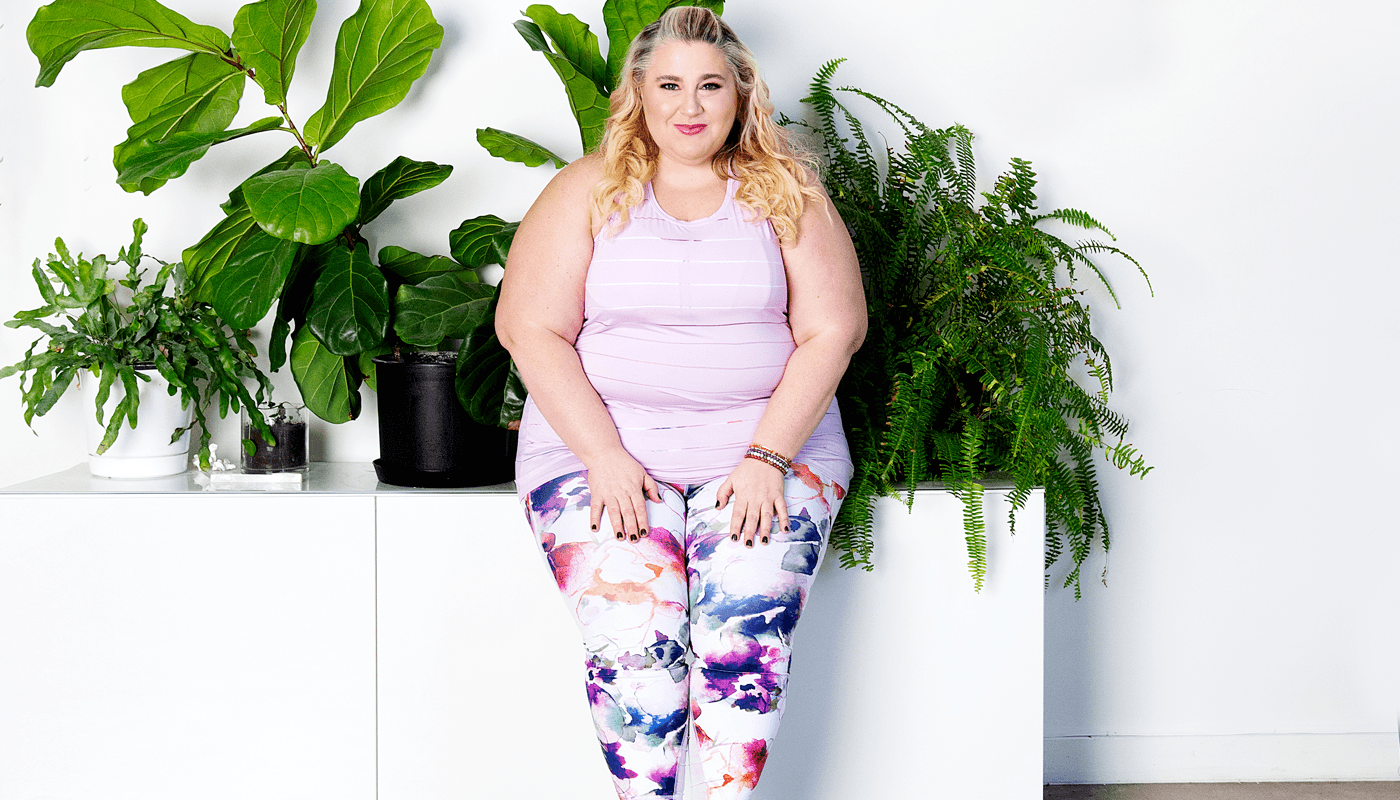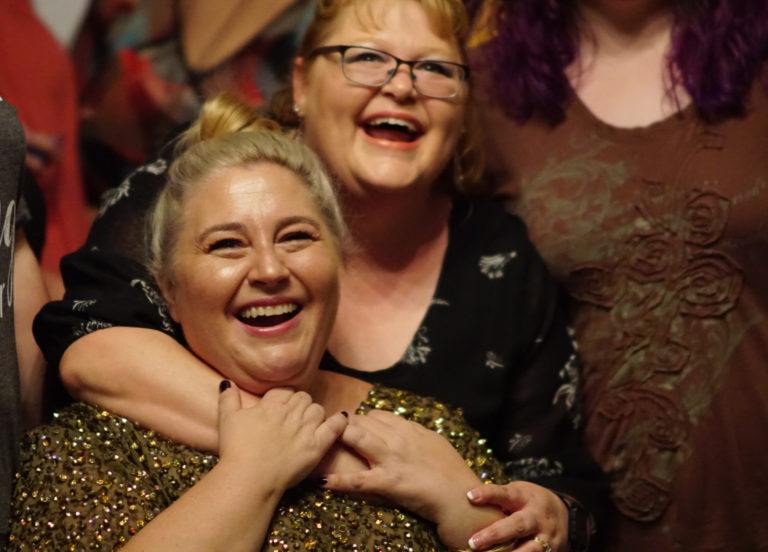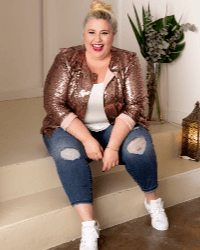
By the time I was 37 years old, I woke up in pain and I went to bed in pain every day. At that time I was very heavy (I weighed about 360 lbs), but I don’t just mean physical pain. On the inside, emotionally, I was miserable. I hadn’t developed a health-full relationship with myself—body or mind—and the days passed in a blur of hurt. In fact, I’d be hard-pressed to admit which was more painful: My lower back and my knees; or the slow-dripping feeling that I might be watching my life pass before my eyes in the fast lane.
Most of us have, at some point, taken an inventory of life and wondered, “Is this all there is for me?” We contemplate our physical limitations or the dull reality that there are things we haven’t experienced; we ruminate over boxes we haven’t checked off. Fear like this doesn’t come pre-packaged in a dress size: It can hit us at any time, any age, and at any weight.
And yet, if you would have asked a random person off the street what was “wrong” with me then, they would probably have remarked that I was fat and needed to go on a diet. In fact, that tends to be the first thing people say to ANY person who appears to be heavier than “normal” that expresses unhappiness. Go on a diet. Lose weight. It will make everything better… Right? Wrong.
The Truth About Diets
Over 90 percent of American women have been on a diet before. I have been one of them—many times. But each endeavor left me with one glaring truth: My diet didn’t “fix” anything. It was never a magical wand that made my problems disappear. We also know that diets fail because such a large portion of people who engage in traditional diet (including myself) gain weight back.
Somewhere along the line I realized it wasn’t about losing weight. It wasn’t about dieting. It was about addressing the fact that both my body and my emotional wellbeing were starting to crumble. It wasn’t the “counting macros” that helped me create real change in my life, but instead, for me, it took seeing how deeply entangled emotional trauma was in the daily dysfunction of my life. The act of removing dating apps from my phone and not engaging in reactive casual sex was the first step toward making the positive shift in my life.
Somewhere along the line, “diet culture” and the “wellness industry” became synonymous. But they’re two totally different things.
That’s to say: Addressing (and closing off) the self-initiated vacuum of relationship nothingness is what led me to realize just how heavily I relied on coping mechanisms like sex and shopping and, oh yes, food, to anesthetize the pain of living with years and years of repressed anger. It wasn’t counting calories. It hasn’t been the use of My Fitness Pal (which I happen to love) that has kept me returning to the long-term commitment to serving my body inside and out, even after life’s normal (but sometimes painful) twists and turns.
The realization of my coping mechanism, nurtured by intense spiritual growth and proactive emotional work, has allowed me to get to grow to where I am today. This is a whole lot deeper than anything a “diet” could unearth. Diets don’t teach people how to feel whole. They teach people how to (usually temporarily) lower numbers on a scale. But the wholeness part? That’s where Wellness should come in.
Should being the operative word.

What Wellness Is (and What It Isn’t)
Wellness should be a place where people come to heal and learn how to live a greater life, however that looks for them. It should be about offering people tools to cultivate wholeness in all the different pillars of life—emotionally, physically, spiritually, sexually, financially, occupationally, and more.
It’s taken a long time, but the medical community has finally started to explore the reasons why diets don’t traditionally work. Additionally, we finally have some people in the general public starting to speak out about the toxicity of “diet culture” and its inability to facilitate the healing that real-life transformation from the inside-out requires.
Sadly, it is the wellness community that appears to be the most tone deaf. The very people who purport to encourage holistic health are some of the biggest perpetrators of disordered living. I’m looking at you, Wellness Brand / Influencer / Festival. I’m talking to you Cleanse Tea and Yoga Brand That Only Makes Pants Up To A Size 10. I’m talking to you Wellness-Related Studio That Doesn’t Have a Single Class for Marginalized Bodies.
The (not-so) secret elephant in the wellness community is that the culture places more value and emphasis on things that many of us refer to as “diet culture” and less on offering people holistic tools to heal and create change from the inside out. I challenge you to read a wellness magazine, go to an event or class, or follow a “wellness influencer” on social media and NOT come into contact with the following words, phrases, or ideas:
- Detoxes and cleanses
- Summer/winter body
- The idea of “clean” and “unclean” eating
- “Bad” food
- Weight loss competitions and diet-bets
- Eating plans that restrict foods
- Exercising to “earn” your food
- “Junk” food
It’s nearly impossible. All these ideas rooted in diet culture, and more, have become part of our wellness lexicon; tools in the pursuit of achieving the perfected, personified idea of what health is supposed to be.Somewhere along the line, “diet culture” and the “wellness industry” became synonymous. But they’re two totally different things, and until we acknowledge this, we’re never going to be able to make the real changes in our communities, or ourselves.
Before you put the brakes on, let’s find a common ground—intentional weight loss is not the enemy. But most people having a conversation about weight loss aren’t actually having a discussion about weight loss—they are talking about the ideas and practices that are associated with diet culture. And when diet culture (and its multi-billion dollar industry) trumps the journey to actual well-being and amalgamates itself with the wellness industry (another multi-billion dollar industry) we’ve got some thinking to do.
Sarah’s Easy Guide to Diet Culture vs Wellness
Diet Culture
- Your “diet” has a start, middle, and an end.
- “Before you started your diet, you were broken. Now, you are awesome. Yeah!”
- Values “thinness” and worships this as the desired “end goal.”
- Equates “thinness” to “health success.”
- Promotes weight loss as a status symbol and demonizes those who do not value weight loss.
- Uses words that attach value to food. ie: Good, bad, clean, dirty.
- Perpetuates “food shame” if you don’t “eat correctly” or “cheat.”
- Phrases you’ll commonly hear: “I feel fat.” // “I’m having a cheat day.”
- Oppress those who are unable to (or don’t wish to) obtain) or display, an idealized version of “health” which can be harmful to transgender persons, persons of size, people of color, persons with disabilities, persons of limited economic means, persons living with chronic diseases, and more.
Holistic Wellness
- Views growth as a long-term process with ebbs and flows. There is no “end” in the journey, only transitions between chapters.
- Accepts that none of us are ever a “finished” product. Also establishes that body size or weight does not equate to worth or human value.
- Understands that all bodies are designed differently and that to pursue wellness means we must take account multiple pillars of wholeness—mental, physical, emotional, spiritual etc.
- Understands that “thinness” at the cost of mental health is not truly being healthful.
- Understands that “health” is relative for all people; Instead, all persons can aim to find a state of wholeness as applies to them.
- If you want to lose weight, do it. If you don’t, do that too. Weight loss can play a role in holistic wellness when pursued alongside mental health.
- Uses neutral words to describe food, ie: Processed, non-processed, nutrition-dense, and organic.
- Food is food. It all gets pooped out in the end. Some is healthier; some is less so. If you eat less healthy stuff, you’re still a good person. The end.
Ready to begin your body love journey? Join Sarah for LIFELOVE, the greatest self-love party ever created! Over the course of a weekend, you’ll connect to self, find community with others, and learn tools to create change all within a supportive and loving environment surrounded by body-inclusive attendees who, just like you, are ready to experience MORE in life. This is not some stuffy workshop. It’s a hands-on, inclusive, and interactive experience designed to help you look your fear in the eye and unleash self-love. You’ll feel accepted and safe. And if you’re a fan of random dance breaks and group karaoke? Even better. LIFELOVE includes Kundalini yoga, meditation, inspirational speakers and small group discussions; it’s the one place that bodies of EVERY size can come together and rise up to create change in life. For tickets and more, click here.
—
 Sarah Sapora loves meditation and cowboy boots, and lives guided by the idea that every day we wake up (at any age or weight) is a chance to transform our life from a place of self-love. She’s a Kundalini yoga teacher who believes that strength training and deep soul-work are equally important in creating a happier and healthier life from the inside out. Sarah’s biggest passion is making holistic wellness accessible to bodies of size. She is a speaker, writer, social influencer, creator of LIFELOVE, a totally size-inclusive personal growth event, and of LifeLove, an app launching in 2019. Sarah uses her voice to cultivate a community of self-love and self-improvement free of diet culture. You can find Sarah online on Instagram or on her website, www.sarahsapora.com.
Sarah Sapora loves meditation and cowboy boots, and lives guided by the idea that every day we wake up (at any age or weight) is a chance to transform our life from a place of self-love. She’s a Kundalini yoga teacher who believes that strength training and deep soul-work are equally important in creating a happier and healthier life from the inside out. Sarah’s biggest passion is making holistic wellness accessible to bodies of size. She is a speaker, writer, social influencer, creator of LIFELOVE, a totally size-inclusive personal growth event, and of LifeLove, an app launching in 2019. Sarah uses her voice to cultivate a community of self-love and self-improvement free of diet culture. You can find Sarah online on Instagram or on her website, www.sarahsapora.com.